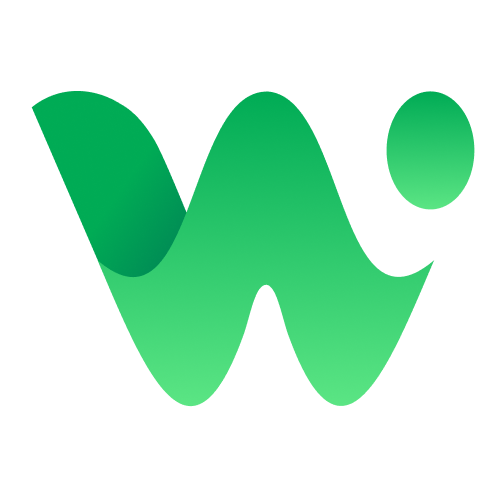The 10 Best Free CRM Software for Your Business in 2025.
Struggling to manage customer relationships without breaking the bank? Our guide shows the best free CRM solutions for 2025. It highlights their strengths and helps you find the right one to improve sales, marketing, and customer service.

Introduction
In the fast-paced business landscape of 2025, staying organized and maintaining strong customer relationships are critical to success. Customer Relationship Management (CRM) software has become an indispensable tool for businesses of all sizes, helping them streamline operations, nurture leads, and boost customer satisfaction. With the rise of digital transformation, CRMs are no longer a luxury but a necessity, enabling businesses to track interactions, automate tasks, and gain actionable insights. For small businesses, startups, and solopreneurs, free CRM solutions offer a cost-effective way to access these powerful tools without breaking the bank. This blog dives into the top 10 free CRM software options for 2025, designed to help you choose the best fit for your business needs.
Why CRM Software is Essential for Businesses in 2025
CRM software is the backbone of modern customer management, offering a centralized platform to store customer data, track sales pipelines, and automate repetitive tasks. In 2025, businesses face increasing competition and evolving customer expectations, making it vital to deliver personalized experiences. CRMs empower teams to manage leads efficiently, improve communication, and make data-driven decisions. From small startups to freelancers, a CRM helps businesses stay organized, save time, and focus on growth, all while fostering stronger relationships with customers.
According to a Forrester research-backed study, 40% of businesses experienced an 11–20% increase in revenue after adopting a CRM platform.
Benefits of Using Free CRM Solutions for Small Businesses and Startups
Free CRM solutions are a game-changer for small businesses and startups operating on tight budgets. These tools provide essential features like contact management, deal tracking, and basic automation at no cost, allowing businesses to compete with larger players. Free CRMs eliminate the financial barrier to adopting technology.
A study published in ResearchGate shows that small businesses using CRM tools saw a 29% increase in sales productivity and a 42% improvement in forecasting accuracy, enabling teams to test and implement systems without upfront investment. Additionally, many free plans offer scalability, meaning businesses can upgrade as they grow, making them ideal for those just starting out or looking to optimize operations without financial risk.
"We see our customers as invited guests to a party, and we are the hosts. It's our job every day to make every important aspect of the customer experience a little bit better." - Jeff Bezos (Founder, Amazon)
How Free CRMs Compare to Paid Options
While paid CRMs often include advanced features like detailed analytics, AI-driven insights, and premium support, free CRMs deliver robust functionality for basic needs. Free plans typically include core features such as contact and pipeline management, email integration, and task automation, sufficient for small teams or early-stage businesses. However, they may come with limitations like restricted user numbers, storage caps, or fewer integrations. Understanding these trade-offs helps businesses decide whether a free CRM meets their needs.
A report by Nucleus Research reveals that CRM solutions return $8.71 for every $1 spent, primarily through automation and time savings.
Criteria for Selecting the Top 10 Free CRMs
To compile this list of the top 10 free CRMs for 2025, we evaluated each tool based on key criteria: ease of use, feature set, scalability, integration options, and limitations. Ease of use ensures quick adoption, especially for teams with limited technical expertise. The feature set includes essential CRM functionalities like contact management and pipeline tracking. Scalability assesses how well the free plan supports growth, while integrations ensure compatibility with tools like email or accounting software. Finally, we considered limitations to provide transparency about what each free plan can and cannot do, helping you make an informed choice.
How to Choose the Right Free CRM for Your Business
Selecting the perfect free CRM for your business in 2025 requires a clear understanding of your needs, priorities, and growth plans. With numerous free CRM options available, each offering unique features and limitations, making an informed choice can set your business up for success. This section outlines key steps to evaluate and choose a CRM that aligns with your goals, ensuring you maximize its value without overspending.
Assessing Your Business Needs
To find the right CRM, start by evaluating your business’s specific requirements. Consider the following criteria:
- Team Size: Determine how many users need access to the CRM. Some free plans limit user numbers, which may affect collaboration.
- Industry Requirements: Identify industry-specific needs, such as real estate’s focus on lead tracking or retail’s need for customer segmentation.
- Core Objectives: Define your primary goals, like improving lead conversion, streamlining customer communication, or organizing contacts.
- Technical Expertise: Assess your team’s comfort with technology to choose a CRM with an appropriate learning curve.
Boost your marketing with WhatsEra for free
WhatsEra Free Plan includes access to all core WhatsEra's features, 900 emails/month, 100 WhatsApp messages 40+ email templates, and customize to grow your email/whatsapp list.
Evaluating Key Features
Not all free CRMs offer the same features in their free plans, so prioritize those that meet your must-have requirements. Key criteria include:
- Contact Management: Ensure the CRM allows sufficient contact storage and easy organization for your customer base.
- Pipeline Tracking: Look for tools to manage sales pipelines, including deal stages and progress tracking.
- Automation Capabilities: Check for basic automation, like task reminders or email follow-ups, to save time.
- Integration Options: Verify compatibility with tools you already use, such as email platforms, calendars, or accounting software.
Testing Free Plans
Before committing, test the CRM to ensure it meets your expectations. Consider these criteria when trialing:
- Ease of Setup: Evaluate how quickly you can set up the CRM and import existing data, like contacts or leads.
- User Interface: Test the interface for intuitiveness to ensure your team can adopt it without extensive training.
- Feature Functionality: Try core features, such as pipeline management or reporting, to confirm they work as expected.
- Support Availability: Check if the free plan offers adequate support, like help guides or community forums, for troubleshooting.
Considering Future Growth and Scalability
A free CRM should support your business as it grows. Focus on these criteria to ensure long-term fit:
- Upgrade Paths: Explore paid plans to understand how the CRM scales with additional features or user limits.
- Data Limits: Confirm the free plan’s storage and contact limits align with your projected growth.
- Flexibility: Choose a CRM that allows customization to adapt to evolving business processes.
- Integration Growth: Ensure the CRM supports advanced integrations as your tech stack expands.
1. HubSpot CRM
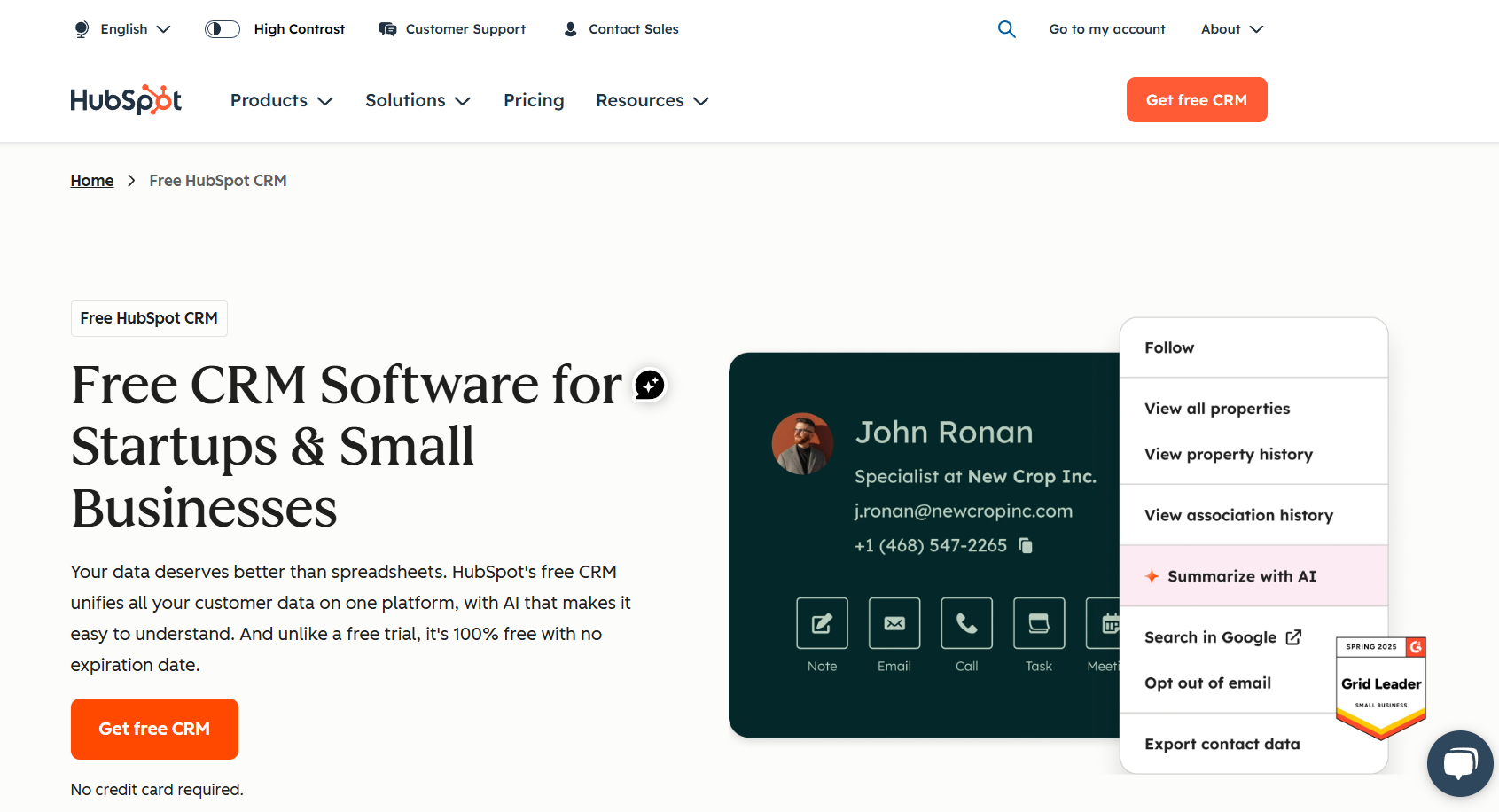
Overview: HubSpot CRM is a leading free CRM solution known for its user-friendly interface and robust feature set, making it a top choice for businesses focused on inbound marketing. It offers a centralized platform to manage contacts, track deals, and streamline communication, all seamlessly integrated with HubSpot’s marketing and sales tools. Key features include contact management, deal pipelines, email tracking, and a universal inbox for managing customer interactions across channels.
- Free Plan Features:
- Unlimited users, 1,000 contacts.
- Contact management, deal pipelines, email tracking, live chat, meeting scheduling.
- Basic reporting, form builder.
- Breeze Copilot AI for data summarization and task automation.
- Paid Plans: Starter at $20/month (2,500 contacts, advanced automation).
- Pros:
- User-friendly drag-and-drop interface.
- Strong integrations (e.g., Gmail, Slack) for email campaigns.
- No time limits on free plan.
- Cons:
- Limited customization in free plan.
- Premium plans get pricey for scaling businesses.
- Best For: Small businesses and startups needing an all-in-one CRM.
2. Zoho CRM
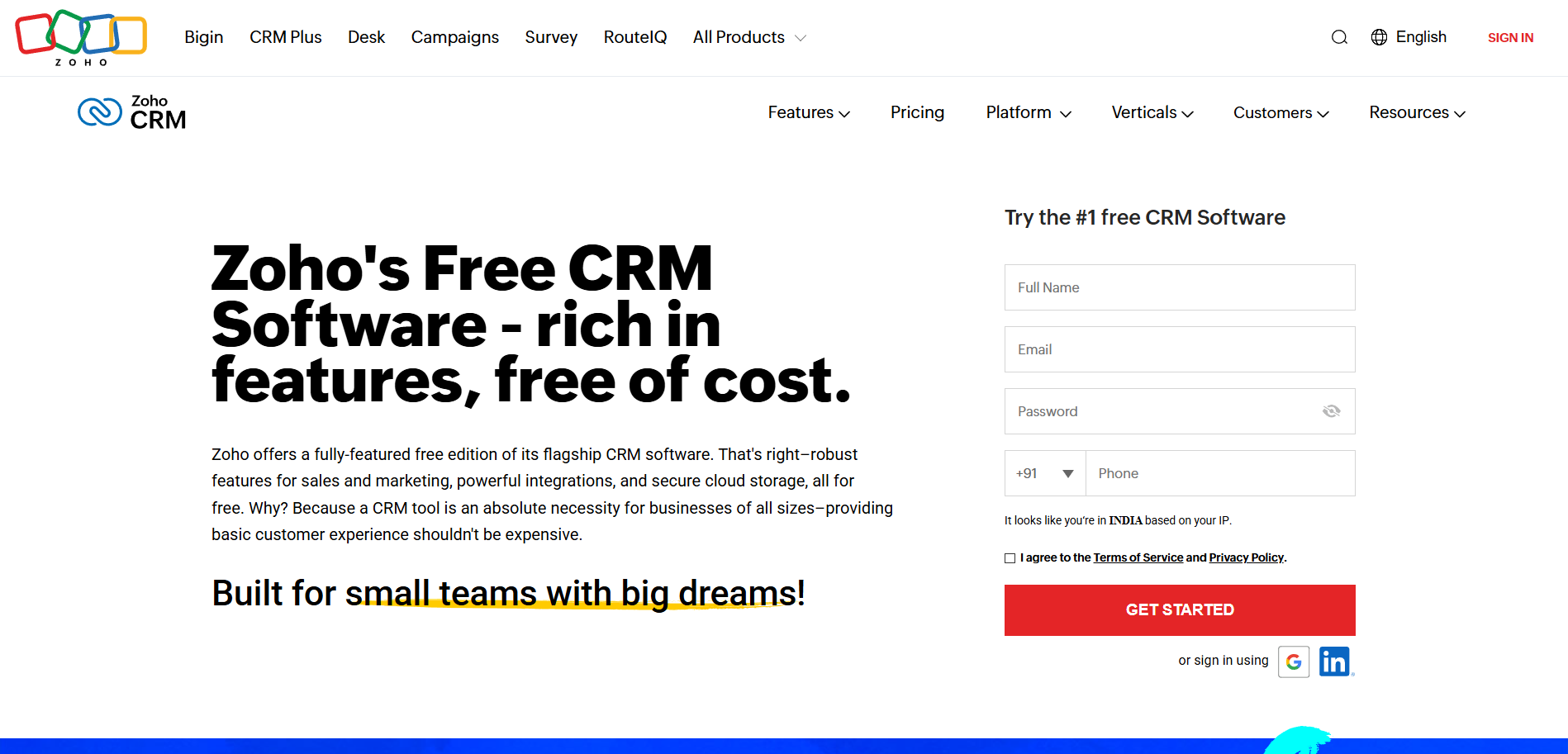
Overview: Zoho CRM is a robust, cloud-based solution designed to help businesses manage customer interactions and streamline sales and marketing processes. It offers a 360-degree view of customers, enabling effective lead management, sales pipeline tracking, and multi-channel communication. Zoho free CRM plan is highly customizable and integrates well with other Zoho applications.
- Free Plan Features:
- 3 users, 5,000 records, 10MB storage.
- Lead and contact management, tasks, workflows, mobile app.
- Basic analytics, email integration, GDPR-compliant security.
- Paid Plans: Standard at $20/user/month (advanced automation, Zia AI insights).
- Pros:
- Affordable upgrades with robust features.
- Seamless integration with Zoho apps and third-party tools.
- Strong security for client data.
- Cons:
- Limited storage and user cap in free plan.
- Interface feels dated.
- Best For: Small teams seeking customization and integrations.
3. Agile CRM
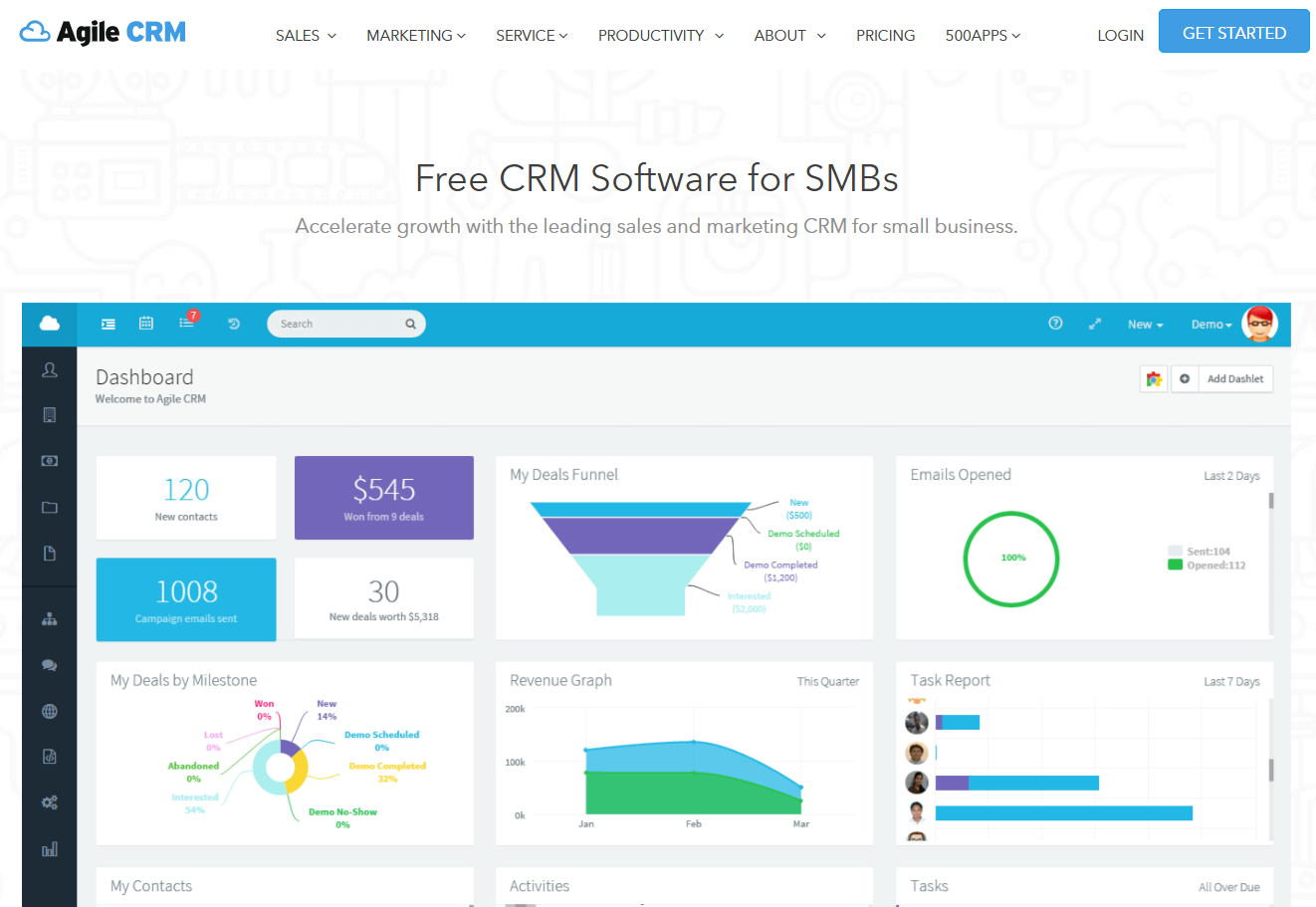
Overview: Agile CRM is an all-in-one SaaS automation tool that integrates sales, marketing, and customer service functionalities onto a single platform. It emphasizes streamlining communication, enhancing team collaboration through real-time data sharing, and organizing personalized marketing campaigns. Agile free CRM plan is often recognized for its comprehensive features and user-friendly interface for small to mid-sized businesses.
- Free Plan Features:
- 10 users, 1,000 contacts, unlimited deals/tasks.
- Email tracking, appointment scheduling, form builder.
- 5,000 branded emails/month, telephony features.
- Paid Plans: Starter at $8.99/user/month (advanced automation, telephony).
- Pros:
- Generous user and email limits.
- All-in-one solution for sales and marketing.
- Intuitive setup for quick adoption.
- Cons:
- Automation builder lacks polish.
- Slow support response (up to 26 hours).
- Best For: Small businesses needing multi-user access and email tools.
"You need to earn and maintain that customer's trust every day, every transaction. The only way you can do that is by measuring everything." - Lew Cirne (Founder, New Relic)
4. Bitrix24
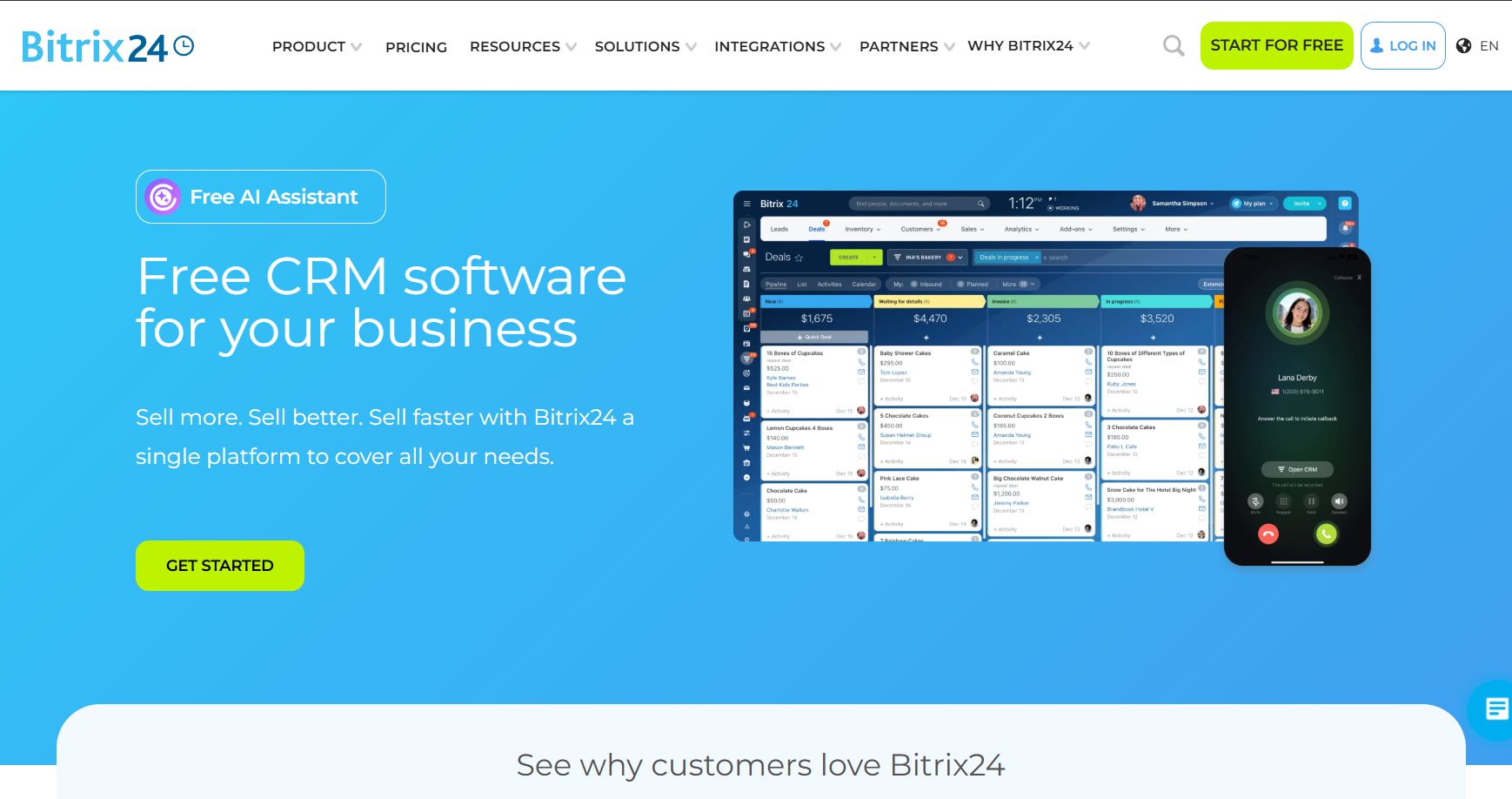
Overview: Bitrix24 is an all-in-one business platform encompassing CRM, project management, collaboration tools, and even a website builder. It's designed to replace multiple software tools by offering a cross-integrated environment for communication, task management, lead generation, and sales process automation. Bitrix24 is popular for its extensive feature set and a generous free CRM plan.
- Free Plan Features:
- Unlimited users/contacts, 5GB storage.
- Task management, live chat, social media integrations.
- Basic pipelines, e-commerce store builder, omnichannel messaging.
- Paid Plans: Basic at $20/month (5 users, advanced features).
- Pros:
- Unlimited contacts for large databases.
- Strong collaboration tools (e.g., shared calendars).
- Cloud-based for accessibility.
- Cons:
- Complex interface for new users.
- Limited support in free plan.
- Best For: Teams prioritizing collaboration and multi-channel communication.
5. Freshsales
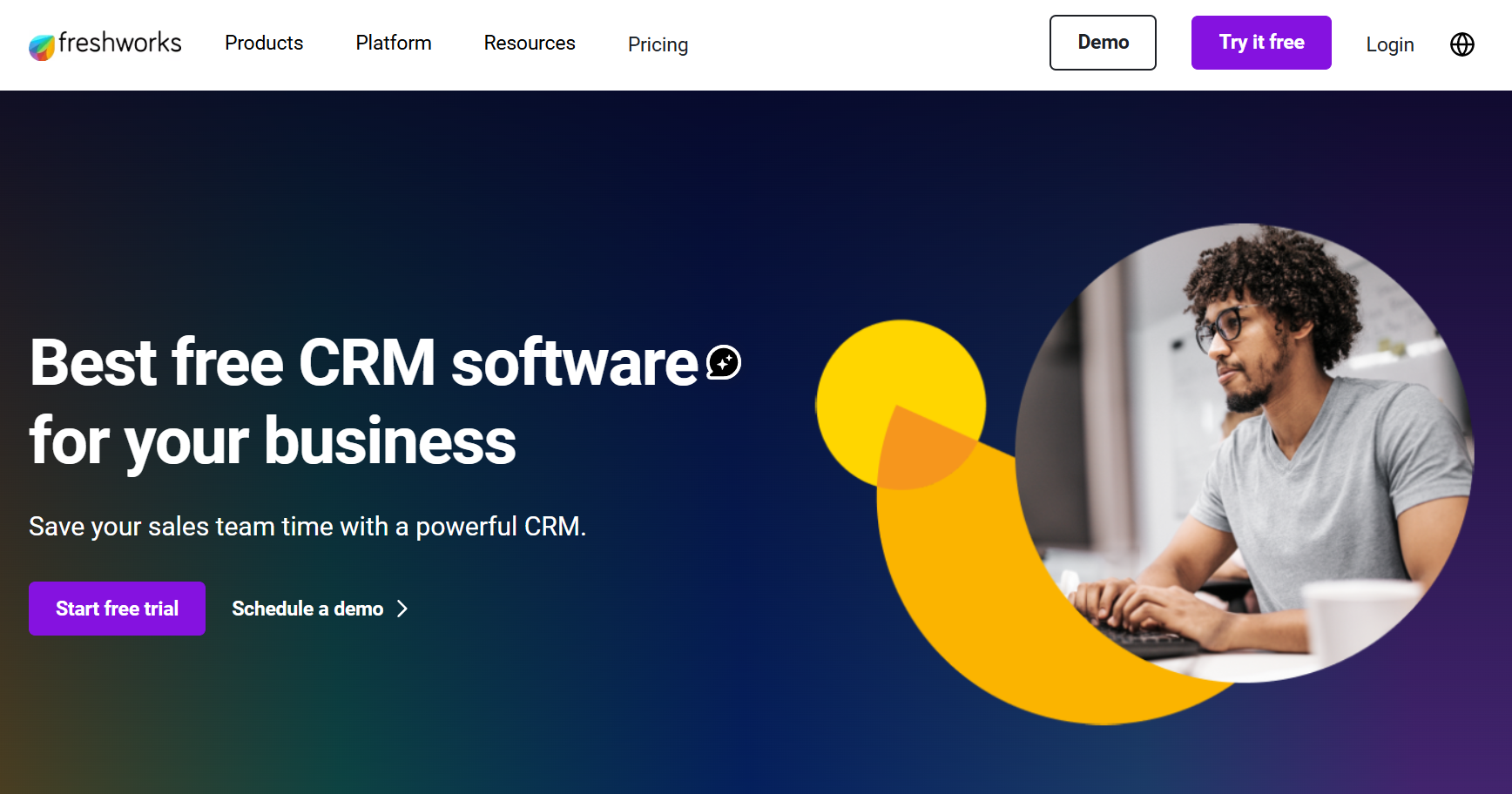
Overview: Freshsales, by Freshworks, is an AI-powered CRM solution focused on simplifying sales and accelerating revenue. It unifies customer data, leverages AI for lead scoring and insights, and provides multi-channel engagement capabilities (email, phone, chat, social media) in thier free CRM plan. Freshsales aims to empower sales teams to sell smarter and close deals faster through automation and real-time visibility.
- Free Plan Features:
- 3 users, 100 contacts, lead scoring, basic pipelines.
- Built-in email and phone, 24/5 support, mobile app.
- AI-driven insights for lead prioritization.
- Paid Plans: Growth at $9/user/month (AI scoring, custom workflows).
- Pros:
- Beautiful, intuitive interface.
- Strong AI tools for lead management.
- Reliable support in free plan.
- Cons:
- Low contact limit (100).
- No reporting in free plan.
- Best For: Sales-focused teams with small contact lists.
6. Monday CRM
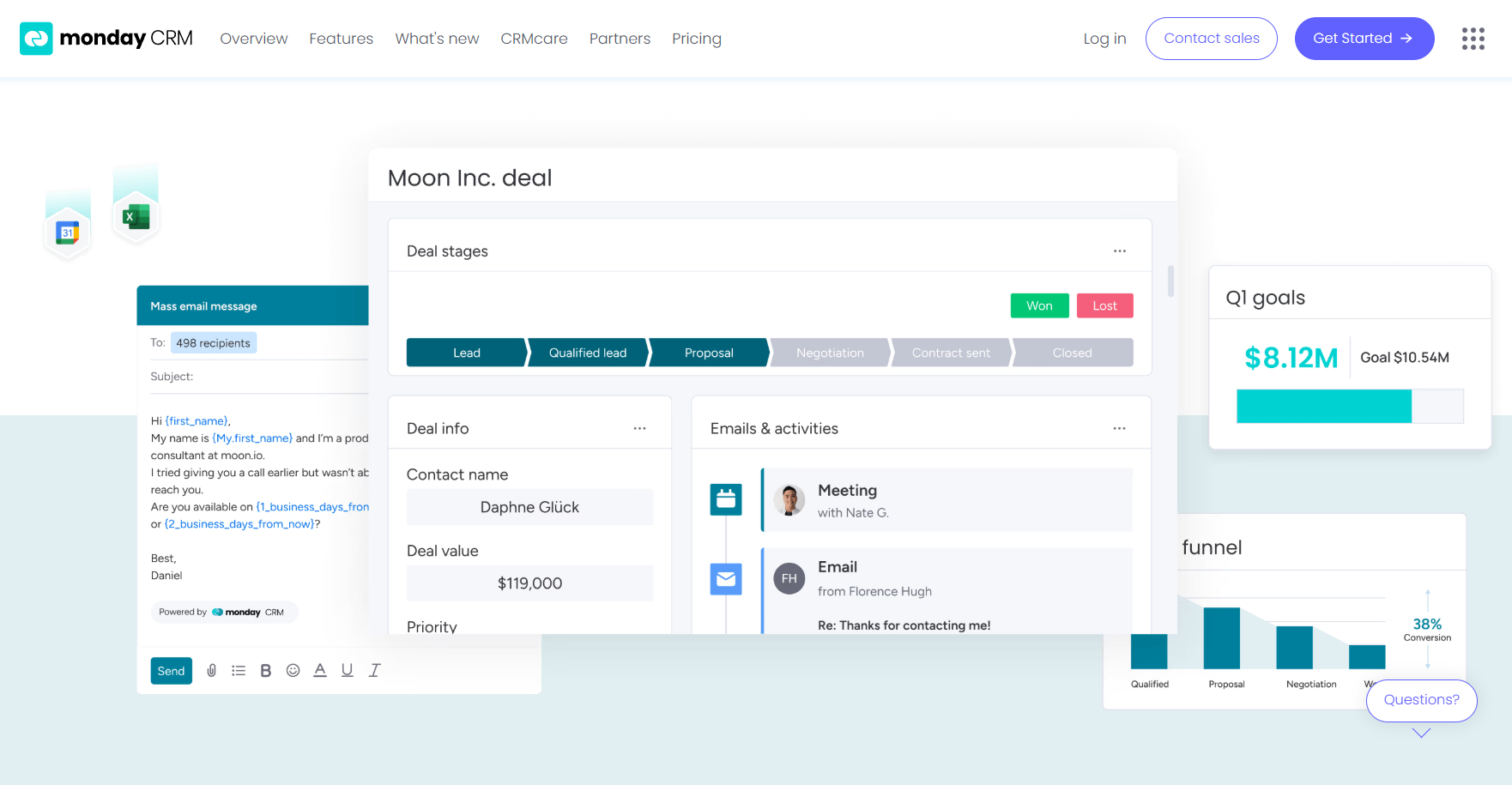
Overview: monday.com, originally a work OS, offers a highly customizable CRM product designed to streamline the entire sales cycle. It leverages its visual and intuitive board-based interface to manage leads, contacts, accounts, and deals with drag-and-drop simplicity. It's known for its flexibility in tailoring pipelines and workflows, strong automation capabilities, and real-time collaboration features to enhance team productivity and provide clear visibility into sales performance.
- Free Plan Features:
- 3 users, unlimited pipelines, 20 columns.
- Drag-and-drop dashboards, lead/contact management.
- Basic integrations (e.g., Gmail, Slack).
- Paid Plans: Basic at $12/user/month (unlimited users, advanced reporting).
- Pros:
- Highly visual and customizable.
- Strong for project-like sales workflows.
- Easy to set up.
- Cons:
- Limited marketing tools.
- Complex for solo users.
- Best For: Teams needing visual sales pipelines.
7. Bigin by Zoho CRM
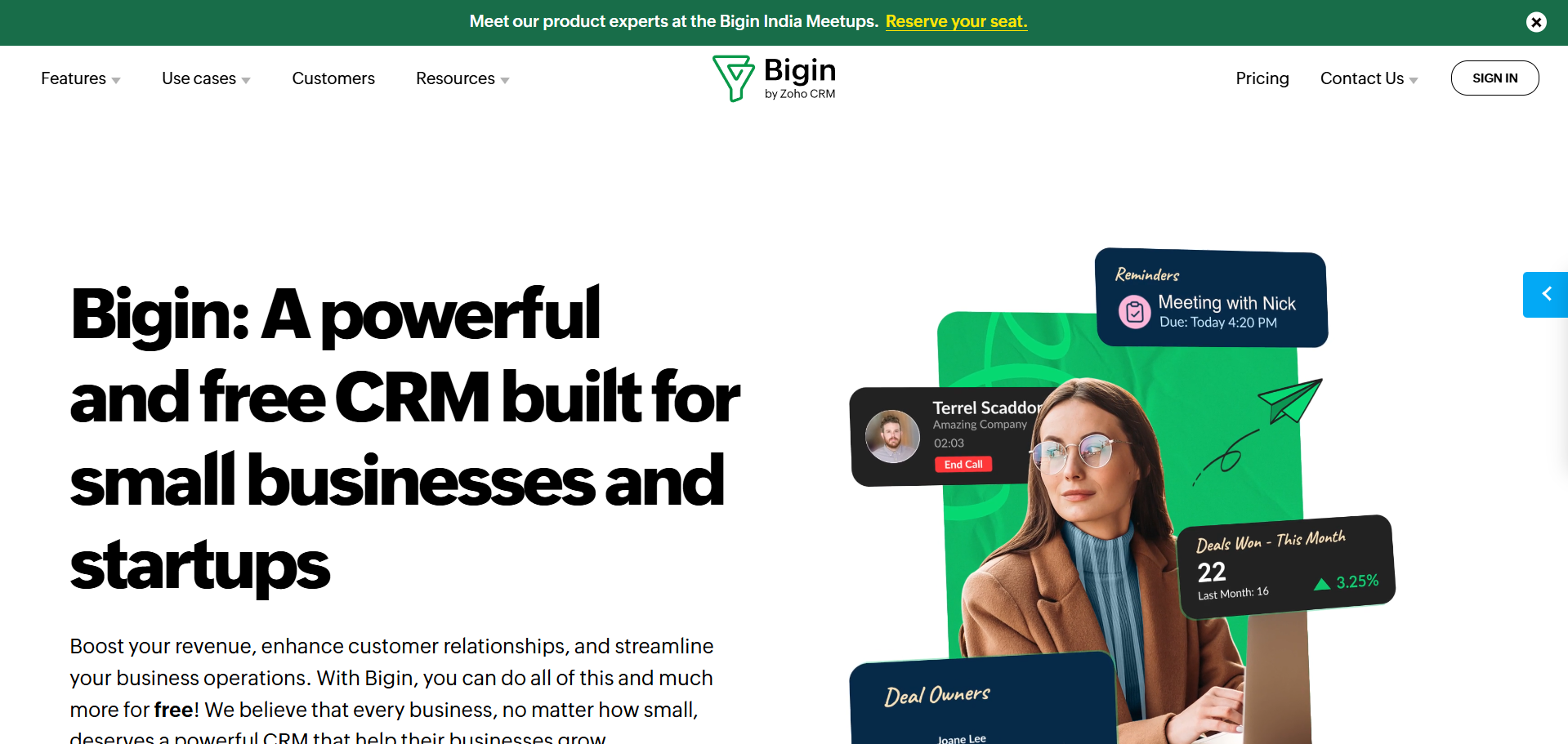
Overview: Bigin is a pipeline-centric CRM specifically built and priced for small businesses, aiming to simplify customer-centric operations. It helps organize business data into contacts, companies, pipelines, and activities, providing a clear visual representation of sales opportunities. Bigin free CRM plan focuses on efficient communication, process automation, and keeping all customer interactions in one place for small teams.
- Free Plan Features:
- 1 user, 500 contacts, 1 pipeline.
- Lead management, tasks, email integration.
- Google Workspace and Zoho app connectivity.
- Paid Plans: Express at $9/user/month (multiple pipelines, automation).
- Pros:
- Beginner-friendly, clean interface.
- Affordable upgrades.
- Strong Google integration.
- Cons:
- Single-user free plan.
- Basic features compared to Zoho CRM.
- Best For: Solopreneurs and freelancers.
8. Flowlu
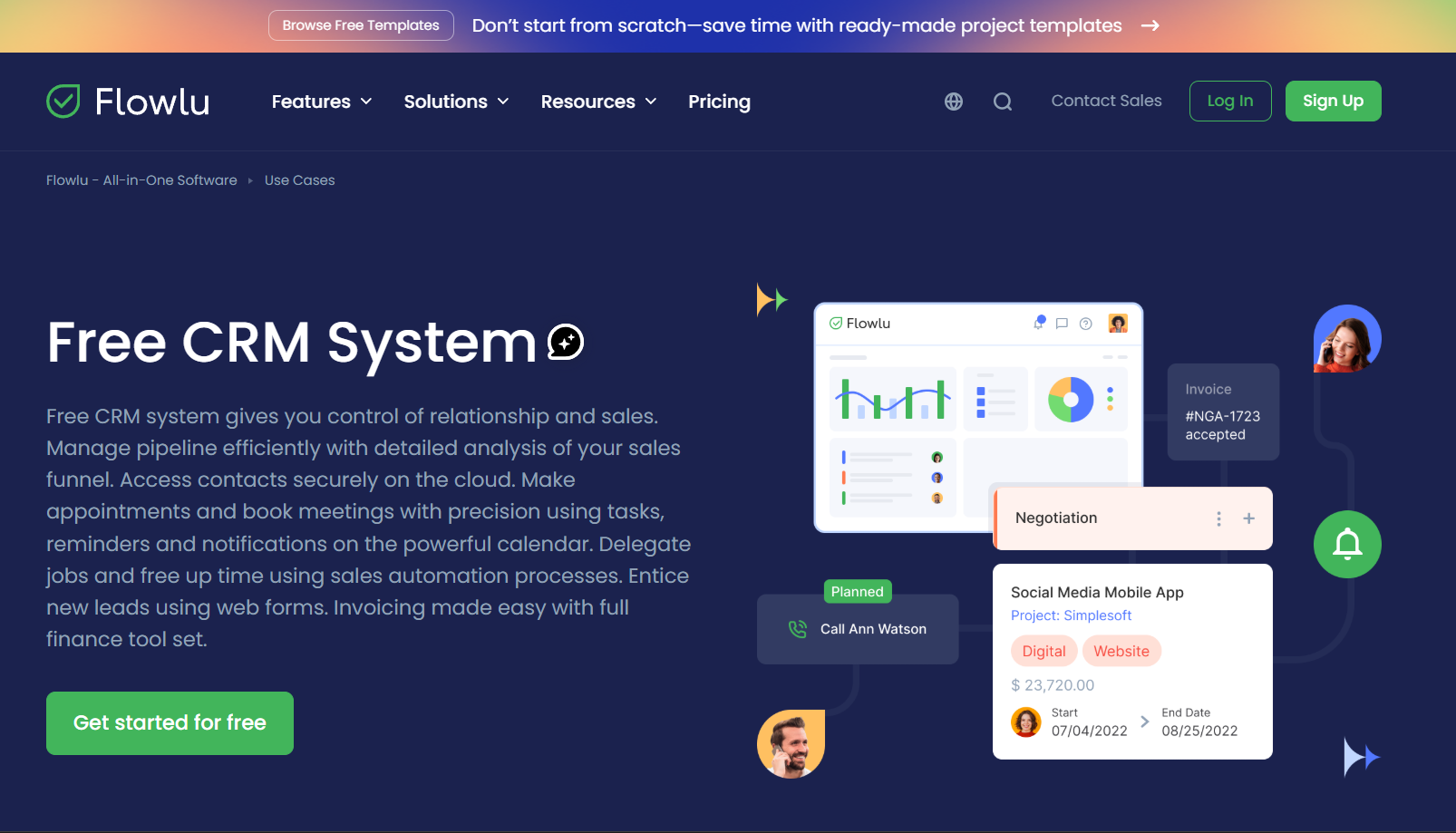
Overview: Flowlu is a comprehensive suite of project and business management tools that includes a CRM, invoicing, Kanban boards, and a client portal. It offers a holistic overview of business operations, from tracking sales funnels and customer interactions to managing projects and finances. Flowlu free CRM plan is designed to automate processes and provide detailed analytics for improved efficiency.
- Free Plan Features:
- 2 users, 100 contacts, invoicing, task management.
- Basic CRM with pipelines, email integration.
- Project planning and financial tracking.
- Paid Plans: Business at $39/month (8 users, advanced features).
- Pros:
- Includes invoicing and project tools.
- User-friendly for small teams.
- Affordable paid plans.
- Cons:
- Low contact limit (100).
- Basic reporting.
- Best For: Startups needing CRM and financial tools.
9. Airtable
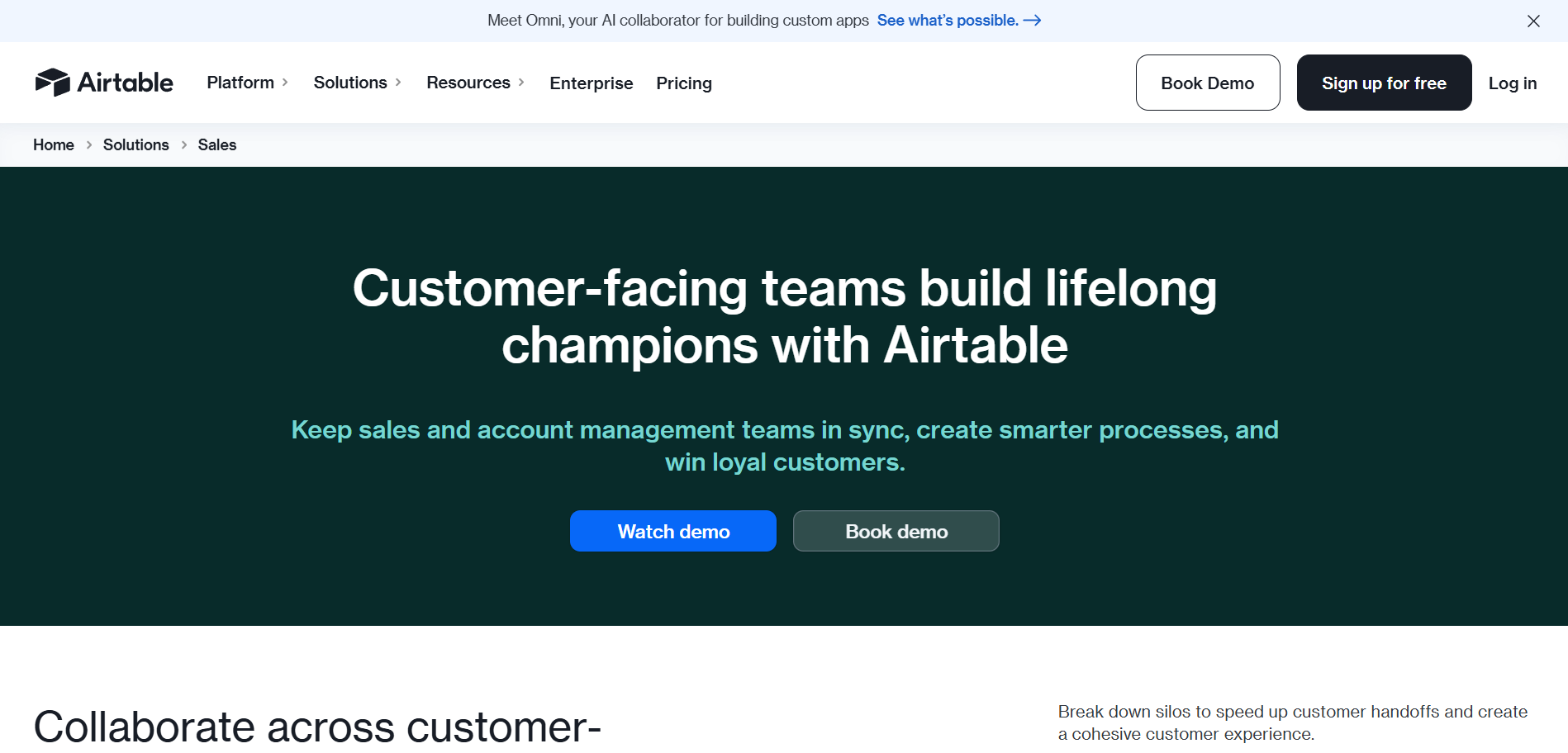
Overview: Airtable functions as a flexible, cloud-based relational database that can be extensively customized to serve as a CRM. While not a dedicated free CRM out-of-the-box, its strength lies in allowing users to build bespoke solutions for managing contacts, tracking projects, and organizing customer data with rich field types and various views (grid, calendar, gallery). It's a powerful tool for those who need a highly adaptable system and are comfortable building their own workflows, often leveraging integrations with other tools.
- Free Plan Features:
- Unlimited bases, 1,200 records, 1GB storage.
- Customizable tables, views (grid, kanban, calendar).
- Templates for CRM, integrations with Gmail/Slack.
- Paid Plans: Team at $20/user/month (advanced automation, more records).
- Pros:
- Highly customizable, visual interface.
- No-code setup for non-technical users.
- Generous free plan limits.
- Cons:
- Not a traditional CRM, lacks sales automation.
- Requires setup effort.
- Best For: Creative teams needing flexible data organization.
10. Nimble
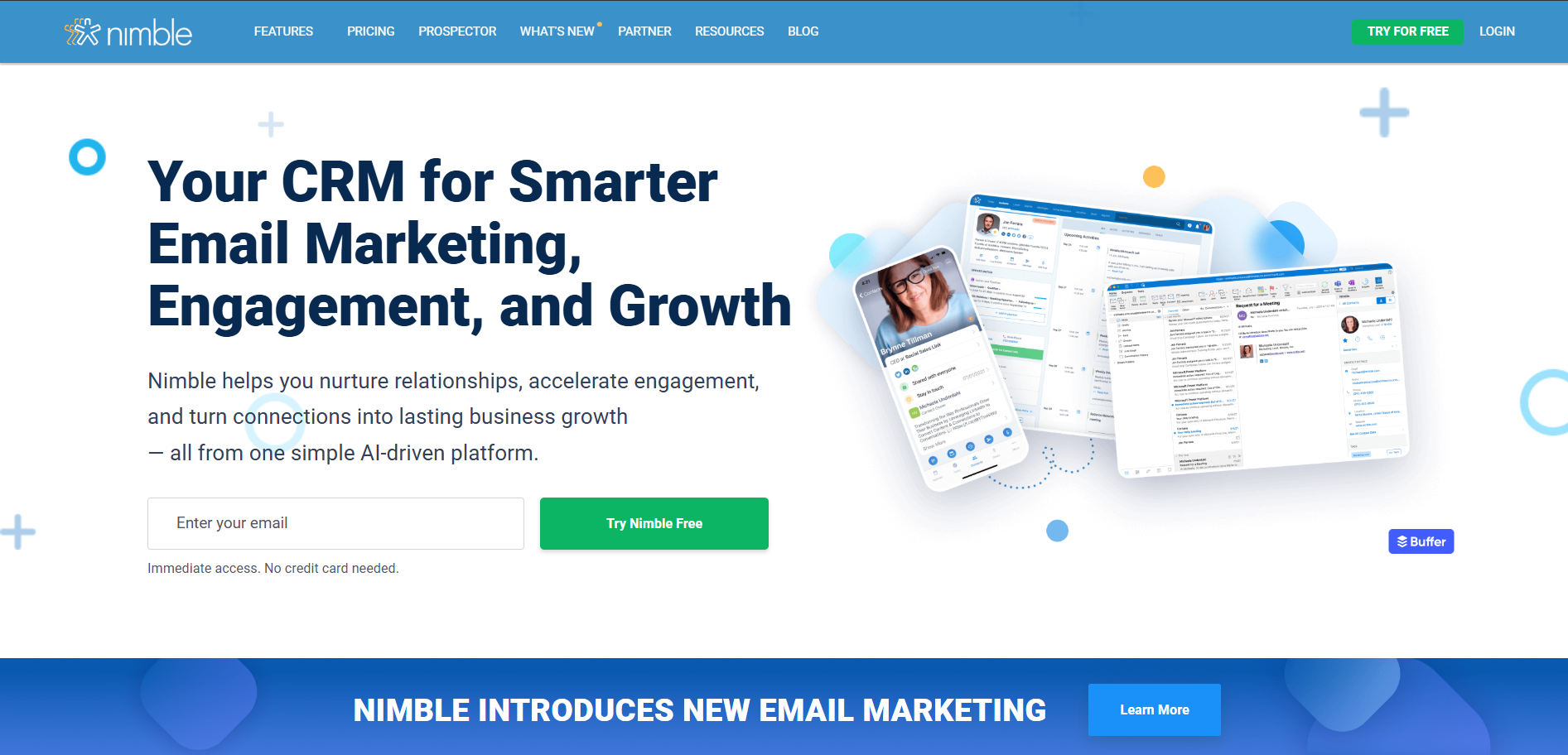
Overview: Nimble is a "Simple Smart CRM" that puts social media and relationship management at its core, particularly for small businesses and sales teams. It excels at automatically enriching contact profiles with social and business data from various sources, providing a comprehensive view of relationships. Nimble free CRM plan focuses on unifying communications, streamlining outreach with trackable templates, and offering a "Today Page" dashboard for an organized overview of upcoming activities and engagement opportunities.
- Free Plan Features:
- 1 user, prospecting tools, email sequences.
- Contact enrichment, social media integrations.
- Browser extension for LinkedIn outreach.
- Paid Plans: Business at $29.90/user/month (custom fields, team features).
- Pros:
- Polished, easy-to-use interface.
- Strong for relationship-driven sales.
- Effective prospecting tools.
- Cons:
- Single-user free plan.
- No built-in telephony.
- Best For: Solopreneurs focused on prospecting.
Conclusion: Finding Your Perfect Free CRM Fit
Choosing the right CRM is a pivotal decision for any business, especially when leveraging free versions to manage customer relationships and drive growth. The wide range of free CRM tools means there is probably a good choice for every need. This includes simple contact management and more complex sales and marketing automation.
Recap of Top Free CRMs and Their Strengths:
We've explored a wide array of free CRM solutions, each bringing unique strengths to the table:
- HubSpot CRM: An all-encompassing platform ideal for businesses seeking a holistic approach to sales, marketing, and customer service with a strong emphasis on automation and data insights.
- Zoho CRM: A highly customizable and scalable solution, perfect for businesses needing robust contact and lead management, with strong integration capabilities within the broader Zoho ecosystem.
- Freshsales: An AI-powered CRM that excels at simplifying sales processes, providing valuable lead insights, and offering multi-channel engagement for accelerated revenue.
- Agile CRM: A comprehensive all-in-one automation tool for sales, marketing, and service, known for its extensive features and user-friendly interface.
- Bitrix24: A feature-rich business platform that combines CRM with project management and collaboration tools, ideal for teams looking to consolidate their operations.
- Bigin by Zoho CRM: A pipeline-centric CRM designed specifically for small businesses, focusing on simplicity, efficient communication, and visual sales tracking.
- Flowlu: A versatile suite of project and business management tools, including CRM, offering a holistic view of operations for enhanced efficiency.
- Capsule CRM: A contact relationship management tool renowned for its user-friendliness and flexibility in organizing customer information and managing deals.
- Zapier Interfaces: While not a traditional CRM, it empowers users to build custom front-ends for data collection and integrate seamlessly with existing CRM systems through automation.
- SuiteCRM: A powerful open-source CRM, offering extensive customization and a cost-effective solution for businesses seeking full control over their data and processes.
- monday.com: A highly visual and customizable work OS that adapts to CRM needs, excelling in sales cycle management, automation, and real-time collaboration.
- Airtable: A flexible relational database that can be tailored into a bespoke CRM, best suited for those who need a highly adaptable system and enjoy building custom solutions.
- Nimble: A "Simple Smart CRM" that excels at social media integration and enriching contact profiles, ideal for sales teams focused on building and nurturing relationships.
To truly maximize your CRM’s impact, integrating it with communication tools like WhatsApp and email is critical. This ensures timely follow-ups, personalized engagement, and seamless automation. Explore our full guide: Why You Should Integrate CRM with WhatsApp
Final Recommendations for Different Business Types:
The "best" free CRM truly depends on your specific needs:
- Small Businesses & Startups:
- HubSpot CRM and Zoho CRM offer comprehensive free plans that can cover many early-stage needs.
- Bigin by Zoho CRM is specifically designed for small businesses and their sales pipelines.
- Capsule CRM and Less Annoying CRM (though not explicitly covered, often cited for simplicity) are also strong contenders for ease of use.
- Sales-Focused Teams:
- Freshsales and Pipedrive (while not always free, often have strong free trials) are excellent for sales pipeline visualization and automation.
- Nimble shines for its social selling and relationship-building capabilities.
- monday.com offers highly visual sales pipeline management.
- Businesses Prioritizing Integration & Automation:
- HubSpot CRM, Zoho CRM, and Agile CRM offer robust automation features and extensive integrations.
- Zapier Interfaces allows for highly customized integrations with almost any other tool.
- Teams Needing Project Management & Collaboration:
- Bitrix24 and Flowlu stand out with their integrated project management and collaboration tools.
- monday.com also excels in this area, offering a strong work OS foundation.
- Technical Users & Customization Enthusiasts:
- Airtable provides unparalleled flexibility for building custom CRM solutions from the ground up.
- SuiteCRM offers open-source freedom for deep customization and control.
Encouragement to Test and Choose the Best Fit
The most effective way to determine the ideal free CRM for your business is to test them out. Leverage the free plans and trials these platforms offer. Pay close attention to:
- Ease of Use: How intuitive is the interface for your team?
- Feature Set: Does it meet your core requirements for contact management, lead tracking, communication, and reporting?
- Scalability: Can it grow with your business, or will you quickly hit limitations?
- Integration Capabilities: Does it connect with other tools you already use or plan to use?
- Support & Community: Is there adequate support available if you encounter issues?
By thoroughly evaluating a few top contenders against your specific business needs and workflows, you can confidently select the free CRM that empowers your team, streamlines your processes, and ultimately fosters stronger customer relationships.
